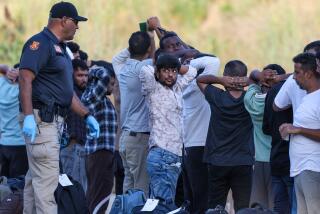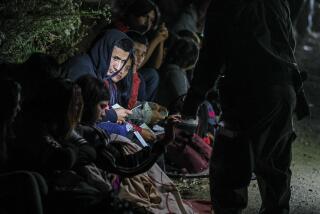Border Patrol Faces New Limits in Inland Empire
Two months after Border Patrol agents made a series of controversial arrests in the Inland Empire, federal officials are finalizing a policy to limit the agency’s operations in interior areas.
Documents and interviews show that Department of Homeland Security officials want to concentrate Border Patrol agents at the borders and limit their inland activity to arresting illegal immigrants while they are traveling from the border and at transportation centers such as Los Angeles International Airport and highway checkpoints such as those in Temecula and San Clemente.
Authorities said the changes were under discussion before the June arrests, which stirred protests in the Latino community. About 450 suspected illegal immigrants in Riverside, San Bernardino and San Diego counties were arrested in less than a month by a specially trained team of 12 agents called the Mobile Patrol Group.
Agents arrested the immigrants in residential and commercial areas, saying they were acting on information about smuggling. The arrests ended when a Homeland Security official said the sweeps violated agency policy because they had not been approved in Washington.
Gloria Chavez, a spokeswoman for U.S. Customs and Border Protection, the parent agency of the Border Patrol, said the proposal is being finalized in a memorandum that will clearly define the responsibilities of the Border Patrol and the U.S. Immigration and Customs Enforcement. Both agencies are part of the Department of Homeland Security.
The Border Patrol will take the lead at the border and on all arrests of illegal immigrants in inland areas as they travel north; ICE agents will focus on enforcement away from border areas and take the lead on all immigration investigations.
Still to be defined, however, is where the border region ends and the inland area begins.
The proposed policy is already drawing fire from Border Patrol agents.
Joseph Dassaro -- president of the National Border Patrol Council, Local 1613, the union that represents 1,500 agents in San Diego -- said ICE was not equipped to enforce immigration law.
ICE agents already conduct investigations of immigrant smuggling rings, in addition to crimes such as terrorism, child pornography, copyright infringement, drug smuggling and customs violations.
“The mission of ICE agents is broad and diluted. They don’t know whether they should be going after terrorists, child pornographers or smuggling rings,” Dassaro said.
R.C. Martinez, Border Patrol spokesman in San Diego, said his office had received more than 2,000 e-mails and telephone calls applauding the June sweeps. The sweeps were ordered to be stopped by Asa Hutchinson, undersecretary for border and transportation security at Homeland Security, who said department officials had to approve them.
The proposed changes are being discussed at a time when a funding shortage has forced ICE administrators to curtail investigations and do more with fewer agents.
A memo from the agency’s San Diego office to senior managers says Homeland Security officials have “encouraged” the special agent in charge to “closely scrutinize all expenditures and curtail spending to the maximum extent possible,” and warns that it is “unknown if any funds will be available to bail out any offices.”
In addition, the memo says the hiring freeze will probably continue into the next fiscal year.
ICE spokesman Russ Knocke declined to say whether the agency had enough money and agents to conduct criminal investigations and carry out the inland enforcement the Border Patrol is performing.
Neither did he say whether his department would launch sweeps of the kind that created controversy for the Border Patrol.
More to Read
Sign up for Essential California
The most important California stories and recommendations in your inbox every morning.
You may occasionally receive promotional content from the Los Angeles Times.










